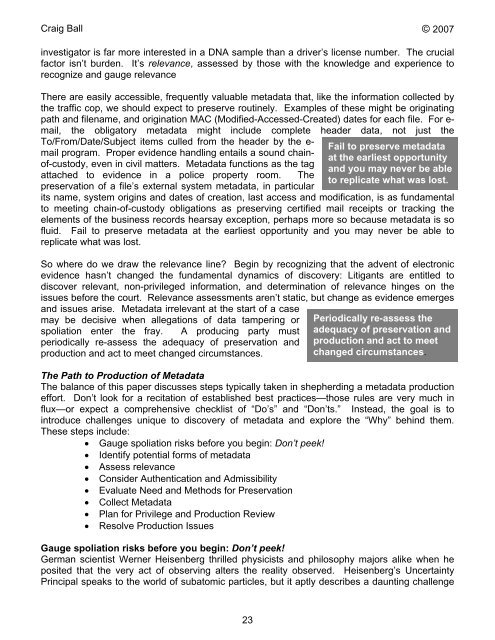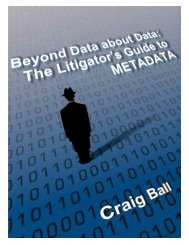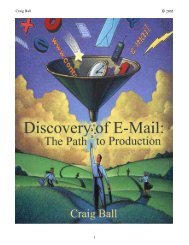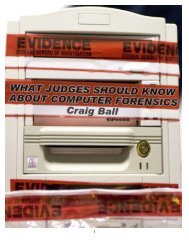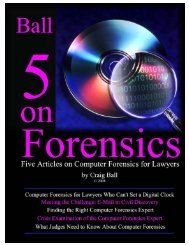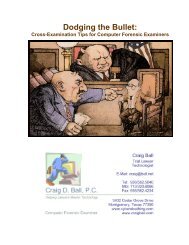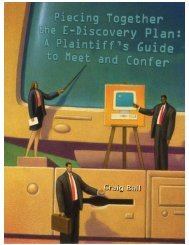Six Articles on Electronic - Craig Ball
Six Articles on Electronic - Craig Ball
Six Articles on Electronic - Craig Ball
You also want an ePaper? Increase the reach of your titles
YUMPU automatically turns print PDFs into web optimized ePapers that Google loves.
<strong>Craig</strong> <strong>Ball</strong> © 2007<br />
investigator is far more interested in a DNA sample than a driver’s license number. The crucial<br />
factor isn’t burden. It’s relevance, assessed by those with the knowledge and experience to<br />
recognize and gauge relevance<br />
There are easily accessible, frequently valuable metadata that, like the informati<strong>on</strong> collected by<br />
the traffic cop, we should expect to preserve routinely. Examples of these might be originating<br />
path and filename, and originati<strong>on</strong> MAC (Modified-Accessed-Created) dates for each file. For e-<br />
mail, the obligatory metadata might include complete header data, not just the<br />
To/From/Date/Subject items culled from the header by the e-<br />
mail program. Proper evidence handling entails a sound chainof-custody,<br />
even in civil matters. Metadata functi<strong>on</strong>s as the tag<br />
Fail to preserve metadata<br />
at the earliest opportunity<br />
and you may never be able<br />
to replicate what was lost.<br />
attached to evidence in a police property room. The<br />
preservati<strong>on</strong> of a file’s external system metadata, in particular<br />
its name, system origins and dates of creati<strong>on</strong>, last access and modificati<strong>on</strong>, is as fundamental<br />
to meeting chain-of-custody obligati<strong>on</strong>s as preserving certified mail receipts or tracking the<br />
elements of the business records hearsay excepti<strong>on</strong>, perhaps more so because metadata is so<br />
fluid. Fail to preserve metadata at the earliest opportunity and you may never be able to<br />
replicate what was lost.<br />
So where do we draw the relevance line? Begin by recognizing that the advent of electr<strong>on</strong>ic<br />
evidence hasn’t changed the fundamental dynamics of discovery: Litigants are entitled to<br />
discover relevant, n<strong>on</strong>-privileged informati<strong>on</strong>, and determinati<strong>on</strong> of relevance hinges <strong>on</strong> the<br />
issues before the court. Relevance assessments aren’t static, but change as evidence emerges<br />
and issues arise. Metadata irrelevant at the start of a case<br />
may be decisive when allegati<strong>on</strong>s of data tampering or<br />
spoliati<strong>on</strong> enter the fray. A producing party must<br />
periodically re-assess the adequacy of preservati<strong>on</strong> and<br />
producti<strong>on</strong> and act to meet changed circumstances.<br />
Periodically re-assess the<br />
adequacy of preservati<strong>on</strong> and<br />
producti<strong>on</strong> and act to meet<br />
changed circumstances.<br />
The Path to Producti<strong>on</strong> of Metadata<br />
The balance of this paper discusses steps typically taken in shepherding a metadata producti<strong>on</strong><br />
effort. D<strong>on</strong>’t look for a recitati<strong>on</strong> of established best practices—those rules are very much in<br />
flux—or expect a comprehensive checklist of “Do’s” and “D<strong>on</strong>’ts.” Instead, the goal is to<br />
introduce challenges unique to discovery of metadata and explore the “Why” behind them.<br />
These steps include:<br />
• Gauge spoliati<strong>on</strong> risks before you begin: D<strong>on</strong>’t peek!<br />
• Identify potential forms of metadata<br />
• Assess relevance<br />
• C<strong>on</strong>sider Authenticati<strong>on</strong> and Admissibility<br />
• Evaluate Need and Methods for Preservati<strong>on</strong><br />
• Collect Metadata<br />
• Plan for Privilege and Producti<strong>on</strong> Review<br />
• Resolve Producti<strong>on</strong> Issues<br />
Gauge spoliati<strong>on</strong> risks before you begin: D<strong>on</strong>’t peek!<br />
German scientist Werner Heisenberg thrilled physicists and philosophy majors alike when he<br />
posited that the very act of observing alters the reality observed. Heisenberg’s Uncertainty<br />
Principal speaks to the world of subatomic particles, but it aptly describes a daunting challenge<br />
23


